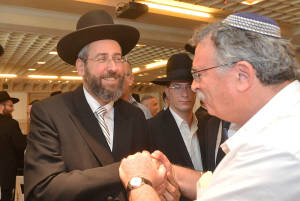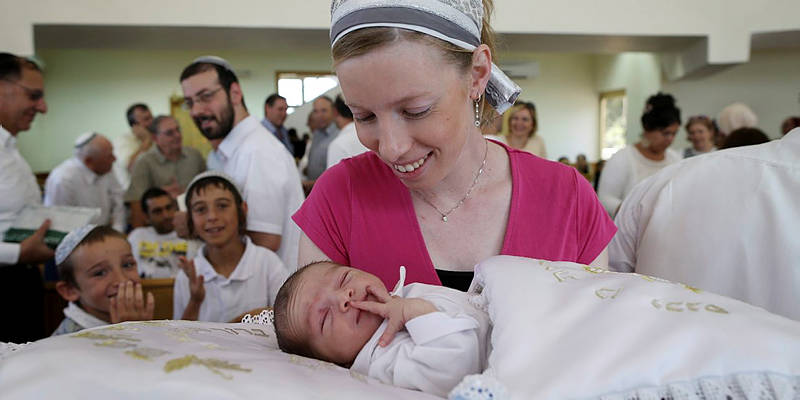
By Rabbi Ari Enkin, rabbinic director, United with Israel
The “brit milah,” or “covenant of circumcision”, is a Jewish religious male circumcision ceremony performed by a ritual and medical expert on the eighth day of a baby boy’s life, as commanded by God.
The brit milah – circumcision – is a fundamental covenant between God and the Jewish people. Performed on an infant boy eight days after birth, the ceremony is followed by a celebratory meal (seudat mitzvah).
What is the Source?
According to the Torah (Genesis 17:10-14), God commanded Abraham to circumcise himself – an act that was to be followed by his descendants:
“This is My covenant which you shall keep, between Me and you, and your seed after you: Every male among you shall be circumcised. And you shall be circumcised in the flesh of your foreskin; and it shall be a token of a covenant between Me and you. He that is eight days old shall be circumcised among you, every male throughout your generations…and My covenant shall be in your flesh for an everlasting covenant. And the uncircumcised male who is not circumcised in the flesh of his foreskin, that soul shall be cut off from his people; he has broken My covenant.”

Israeli Ashkenazi Chief Rabbi David Lau at brit milah of his grandson near Tel Aviv in July 2013. (Yossi Zeliger/FLASH90)
So too, in Leviticus 12:3 we read: “And in the eighth day the flesh of his foreskin shall be circumcised.”
As we can see, it is considered reprehensible not to circumcise one’s sons or to remain uncircumcised oneself. In fact, throughout Scripture, the term areilim is used to denote the Philistines and other non-Jews who were, historically, never circumcised. It is also a word used to convey impurity. The penalty for non-circumcision is karet, a spiritual excision from the Jewish nation. It is interesting to note that Jewish boys born in the wilderness after the Exodus from Egypt were not circumcised. As Joshua 5:2-9 explains, “All the people that came out” of Egypt were circumcised, but those “born in the wilderness” were not. Therefore, before their first celebration of Passover in the Land of Israel, Joshua had them circumcised at Gilgal.
The brit is performed on the eighth day after the baby’s birth. Keep in mind, however, that a Jewish day begins after sunset. As such, if a baby is born on Sunday before sunset, the brit will be held the following Sunday morning. However, if born on Sunday night after sunset, the Brit is on the following Monday morning. The brit takes place on the eighth day following birth even if that day falls on Shabbat, Yom Kippur or any other holiday. A brit is best performed in the morning, but it may be performed any time during daylight hours.
The Mohel
A mohel is a Jewish person, often a rabbi, trained in the practice of brit milah from both a ritual and a medical perspective. According to Jewish law, in the absence of a proper mohel, any Jewish woman, or even a child who has the required skills, may perform a circumcision. Actually, according to Torah law, the father of a baby is required to perform the brit himself. The reality, however, is that most fathers are not trained to do so. As such, the mohel is essentially the father’s direct agent, performing the brit milah on his behalf.
The Three Components
This step is called chituch, which is the cutting of the foreskin
Beneath the foreskin lies a thin membrane. The mohel tears this membrane and pulls it back, thereby exposing the corona completely. This step is called priah, meaning “uncovering.”
The third step is known as metzitza, meaning “suction”. Under Jewish law, the mohel must draw out some of the blood from the circumcision wound. Most do it by hand with a suction device, but some Orthodox mohels use their mouth to draw out the blood.
Although many ritual circumcisions are held at a synagogue, they may be performed at any location. For many people, however, it is simply easier to hold a brit at a synagogue, since a brit almost always follows the morning service, which usually takes place at the synagogue. After the ceremony, a celebratory meal is held. It is customary to serve meat and/or fish and wine at this meal. Additional prayers are recited as part of the Grace after Meals.


